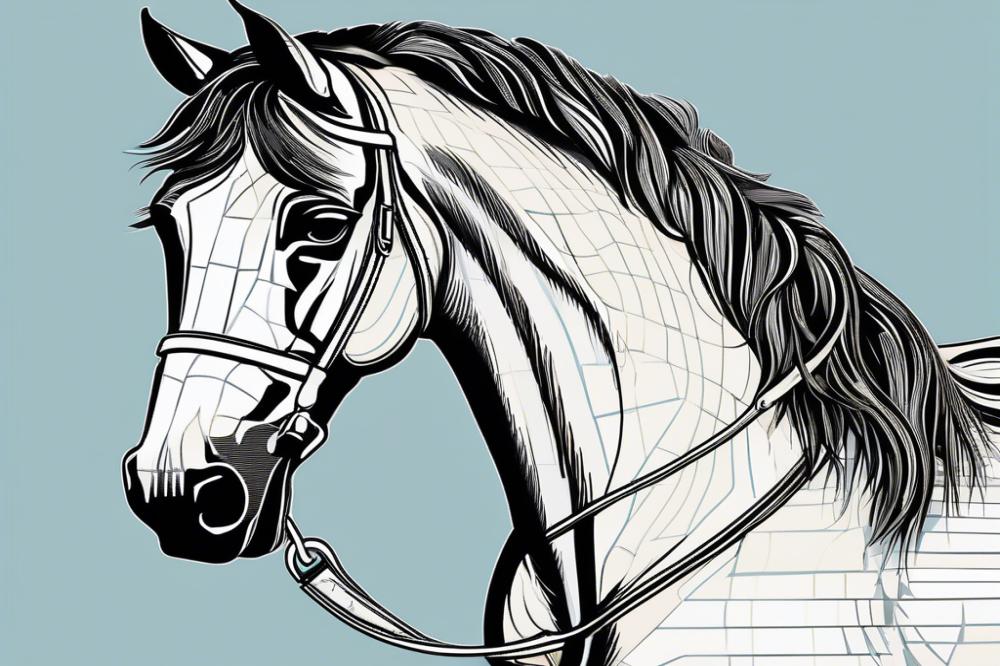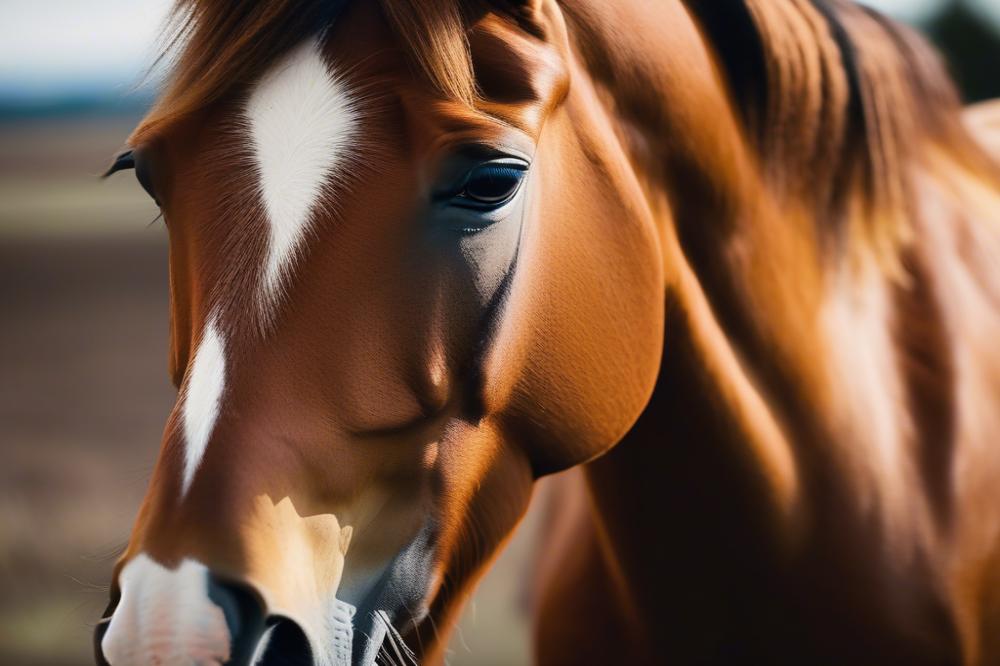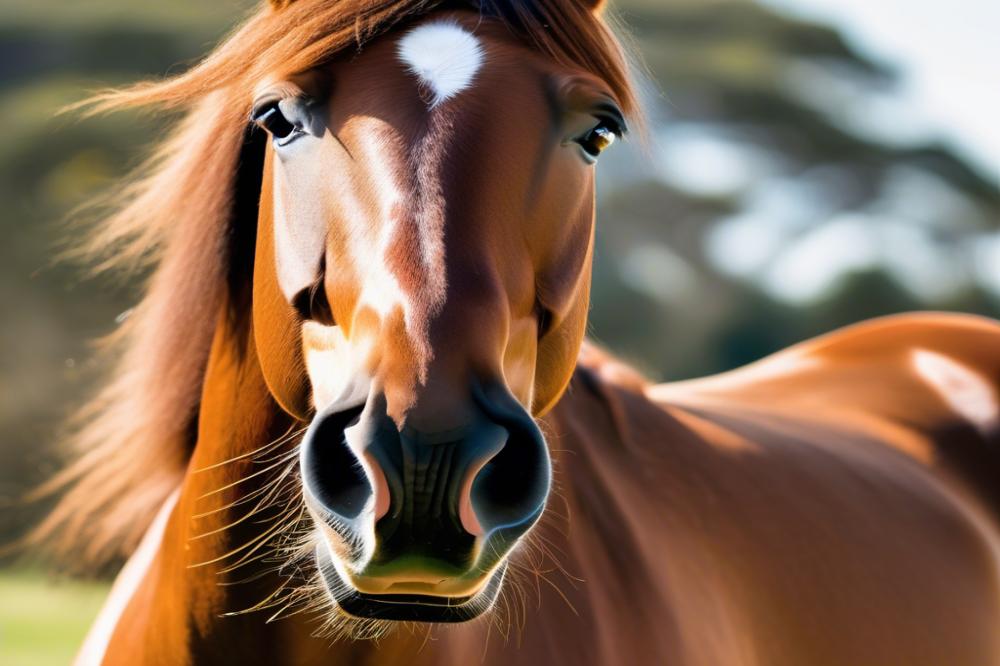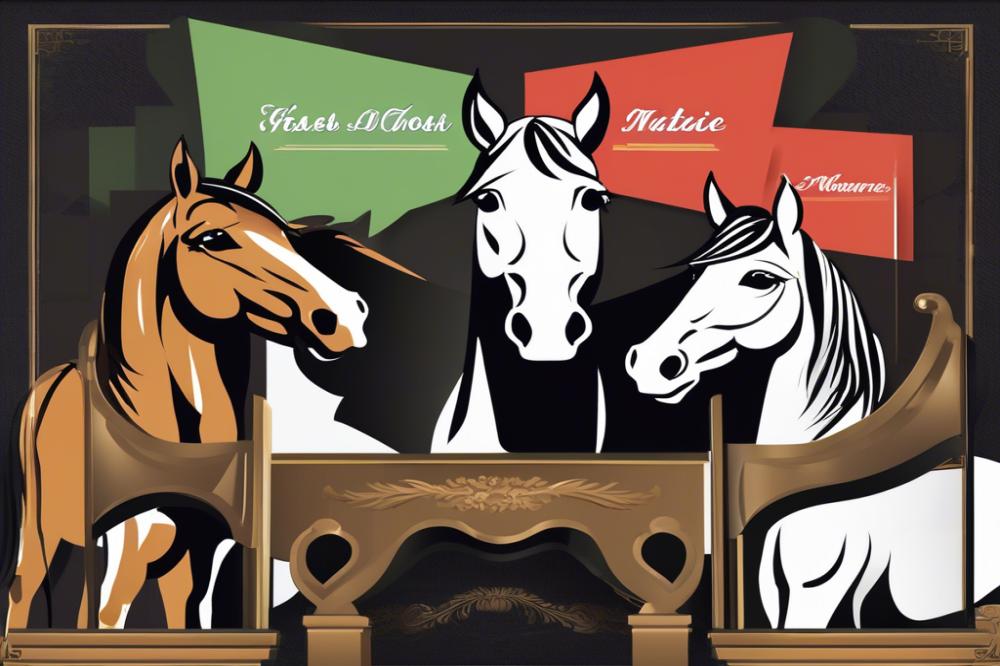Horses with Mustaches: A Curious Quirk
You may have noticed that not all horses look the same. Some flaunt a special feature that can leave you chuckling—you guessed it, mustaches! Although it may seem like a quirky trait, these funny facial hairs have a fascinating role in the world of equine beauty. Horse breeds vary greatly, and just as each one possesses distinct characteristics, so do some have this delightful tuft of hair. For some folks, spotting a horse with a mustache can be the highlight of a day spent in the stables.
Why They Matter
This little detail goes beyond mere aesthetics. Mustaches can point to the horse’s health and gene pool, helping enthusiasts have a deeper understanding of their favorites. Moreover, they play a role in horse care and grooming routines. Keeping a horse’s face clean is necessary, especially if it’s adorned with facial hair! Those who invest time in equine grooming know it can be a labor of love. You wouldn’t want to leave the mustache unattended; it’s just like leaving a snack on your face after lunch! Seriously, horses can be just as picky about their looks as many people.
The purpose of this article is to dive into the world of mustachioed horses. There’s so much more than meets the eye when it comes to their appearance. Ever wondered if the fabulous mustache is linked to unique health traits or if horses like Big Jake, known for their size, can flaunt such charm as well? Whether you’re a horse lover, someone curious about horse health, or just looking for fun facts, this piece is for you. Remember, each horse has its own charm and story, much like the graceful arabian horse gait that catches everyone’s attention on the field.
So, saddle up and get ready to explore this intriguing topic, one mustache at a time!
What Are Horses with Mustaches

Definition of Mustaches in Horses
Mustaches on horses aren’t like the ones you see on people. Instead, they are simply longer hairs that grow around the muzzle area. This area has a unique similarity to facial hair, giving it a mustachio-like appearance. You might also hear these referred to as “whiskers” or “vibrissae.” They play a role in sensory perception, helping horses navigate their environment. While not as stylish as a human mustache, they certainly give the horse a charming touch!
Visual Description and Common Characteristics
Imagine a horse with a hairy fringe spilling over its upper lip. These hairs can be wiry or soft and vary greatly in thickness. In some horses, these hairs stand out clearly, while in others, they blend into the coat, making them less noticeable. Not all equine characteristics include long facial hair. However, those who do often have unique visual traits that make them stand out among their peers. A mustached equine can look both regal and oddly adorable at the same time! It’s as if they are always ready for a photo op.
Examples of Horse Breeds Known for Mustaches
Some horse breeds are more likely to flaunt these distinctive traits. The Arabian horse, known for its beauty and grace, often sports noticeable whiskers. Another breed that may surprise you is the Gypsy Vanner, recognized for its flowing mane and tail. These horses have temperaments as lovely as their looks. Other breeds like the Shire or the Clydesdale can also exhibit this charm. Each breed has specific traits, yet all provide delightful surprises in horse care. Maintaining these mustaches may require a bit of grooming, but it’s worth it for such personality. Remember, mustaches aren’t just for show; they can also play a role in horse health. A healthy horse should have strong and vibrant whiskers.
Genetic Factors Behind Mustaches

Ever noticed that some horses seem to sport mustaches like they’re preparing for a night out? It turns out genetics plays a big role in this quirky equine characteristic. Just like in humans, certain traits come from inherited genes. Attributes like coat color, size, and yes, even facial hair, are influenced by these tiny building blocks of life.
Researchers have identified specific genes linked to the presence of mustaches in various horse breeds. One prominent gene is thought to affect pigment and hair texture. When considering horse care and grooming, it’s essential to understand these traits. Some horses might have wispy facial hair due to a combination of genetics and environment. Others, however, might flaunt a full mustache as if ready to join a rodeo.
Variability exists among individual horses too. Some may have noticeable mustaches that make them look like they’re sporting a fancy disguise! Others might just have a hint of hair, almost like a shy whisper rather than a bold statement. Breeds that are more likely to exhibit these traits can offer a fascinating glimpse into how genetics shapes horse health and appearance.
Diagramming horse traits can feel a bit like piecing together a family tree. Every horse is unique in its own way—some might have a striking look, while others seem more conventional. This variety can spark interest for horse lovers who enjoy learning about different breeds and their quirks. So, the next time you see a horse with a mustache, remember—there’s a genetic story behind that charming view!
Cultural and Historical Significance

Role of Horses with Mustaches in Different Cultures
Throughout history, many cultures have celebrated distinctive traits in animals. Mustached horses have often been part of folklore and stories passed down through generations. In some cultures, these animals symbolize strength and loyalty. For example, in certain Native American tribes, horses with unusual facial markings were believed to be spirit guides. They thought these markings connected the horse to the spiritual world, making it more powerful. Various festivals featured mustached horses, showcasing them for their beauty and rarity.
Famous Horses with Mustaches in History and Media
History has its share of notable mustached equines. A famous example is “The Phantom,” a character from comics, depicted as a heroic horse sporting a mustache. This fictional horse has captivated many readers. In real life, famous racehorses sometimes sport quirky traits, including mustaches. Such horses have attracted attention at events, bringing smiles to spectators. Pop culture often highlights these characters, merging myths with modern tales. Movies and cartoons frequently feature mustached horses, making them beloved icons.
Symbolism and Folklore Surrounding Mustached Horses
In various myths, horses embody freedom and adventure. A mustache can add layers to this symbolism, representing a blend of charm and bravery. Legends speak of mustached steeds as protectors of heroes, guiding them through challenges. Moreover, some folks swear that horses with this trait bring good luck. Picture this: a horse with a thick mustache might just be the secret to winning a race! When families care for their animals, they often share tales about any quirky features. It sparks joy and laughter, bonding people through shared stories.
Horse care and grooming are also tied to the unique traits of these animals. Owners take pride in their horses’ appearance, knowing good grooming can highlight interesting characteristics. Equine grooming not only keeps them healthy but enhances their charm too. In summary, mustached equines are not just a sight to behold; they hold stories and meanings that connect us to the past and present.
Physical Function of Mustaches
When you look at some horses, you might notice a little facial hair. That’s right! We’re talking about mustaches. These whiskers aren’t just there for show; they serve real purposes. One function is to help horses sense their surroundings. Just like cats use their whiskers, these equine characteristics may help horses feel what’s nearby, especially when they’re eating or exploring.
Reasons for Facial Hair on Horses
Facial hair in horses can vary quite a bit among different horse breeds. Some might have a fair amount of fuzz, while others are practically bare. This depends on genetics and the specific traits of the breed. The hair around the face can help protect sensitive skin from sun damage, dust, or even insects. Ever notice a horse swatting flies with its nose? Having a mustache might help with that, too!
Possible Benefits of Mustaches in Different Environments
Imagine a horse living in a sunny area. A mustache can provide some shade and protection from harsh rays. In a dusty environment, facial hair may help trap particles before they reach the horse’s nose. That’s like having a little filter to keep their breathing easier. Horses in cold climates might enjoy a bit of extra warmth from that little patch of hair, too. Who knew mustaches could be multifunctional!
Comparisons to Other Animals with Facial Hair
When considering facial hair, it’s worth looking at other animals. Take dogs, for instance. A puppy’s whiskers help it navigate in tight spaces. Similar to our equine friends, their mustaches offer sensory aids. Even cats have these features, relying on them to gauge their surroundings. This connection across species shows that facial hair isn’t just a quirky trait. It’s a handy tool for many creatures, helping them survive in their unique environments.
In animal care, understanding these traits can be helpful. It leads us to better horse care practices. Grooming a horse can also mean paying extra attention to their facial hair. Keeping it clean contributes to good horse health. It’s fascinating how something so simple can have multiple roles both in the wild and on the farm!
Care and Grooming for Mustached Horses
Best practices for maintaining the mustache
Maintaining a horse’s mustache involves regular care. Just like our own facial hair, their mustaches need attention. Daily checks can catch tangles or dirt quickly. Soft brushes work best to keep it neat and tidy. Gentle brushing prevents discomfort and helps keep the mustache looking sharp.
Consider using a mix of grooming tools. A comb can help manage those tricky knots, while a bristle brush adds a finishing touch. Keeping the mustache clean is very important for horse health. Dirt and debris can cause irritation, which is not fun for your horse.
Tips for grooming and caring for facial hair
Regular grooming can turn into a bonding experience. Spend some time chatting with your horse while you groom. This helps them relax and enjoy the process. Always approach the mustache with love and care.
Use a damp cloth for quick clean-ups if mud happens to stick. Just like a dirty shirt, a dirty mustache needs attention. During grooming, pay attention to the skin underneath. If you notice redness or irritation, it might need special care.
Do not forget to check for any unusual growth. Changes in the mustache itself can be a sign of health issues. If something looks off, consult with your veterinarian to address any concerns.
Common issues and how to address them
Facial hair can sometimes gather more than just dirt. Fly bites or even hay can become trapped in the mustache. This can lead to discomfort and even infections. If you find debris lodged in there, don’t panic. A gentle tug and some soapy water can help clean it out safely.
Equine characteristics can vary widely among different horse breeds. Some horses may get dry skin around their mustache. This can happen more in dry climates. Applying a little bit of unscented lotion can help soothe irritated skin. Always keep an eye on itching or excessive scratching.
Lastly, watch for bad smells. A mustache that stinks might need more than a bath; it could mean an underlying issue. Stay alert and always be prepared to consult a vet if the mustache causes problems.
The right horse care is essential in keeping those facial features healthy. Treat their mustache, and they’ll be the talk of the barn!
Fun Facts and Trivia
Interesting Anecdotes About Famous Horses
Did you know that there are some beloved horses famous for their mustaches? One such example is “Silver,” the trusty steed of the legendary cowboy, The Lone Ranger. Silver wasn’t just a heroic horse; he had a unique look that made him stand out from the herd. Seeing a mustached horse gallop off into the sunset can still tug at the heartstrings of many fans. Then there’s “Clyde,” a show horse known for his impressive stache, which was almost as big as his gentle heart. At various competitions, visitors often commented more about Clyde’s mustache than his impeccable performance!
Unique Behaviors or Traits
Personality traits can differ among horses with facial hair. Some believe equine characteristics, like having a mustache, indicate a more laid-back attitude. These horses tend to seek a friendly pat more often than others. Their facial hair can even invite attention, causing them to become the life of the barn! Funny incidents often happen, where a gentle breeze stirs their mustache while they munch on hay. It’s like watching a little performance art in the stable! Grooming sessions might involve extra laughs when the mustache gets tied up in knots from playful brushes.
Community Perception
People’s views on mustached horses can be quite amusing. Many equestrians admire these quirky features and often remark on their charm. Social media showcases tons of mustache-loving fans who snap pictures with these equine pals. It is not uncommon for folks to create silly memes or cartoons about horses sporting mustaches. In addition to capturing attention, mustached horses can be seen as symbols of good luck in certain communities.
Horse breeds play a role too. Some breeds seem more prone to facial hair, giving them character in a friendly way. Riders involved in horse care often share tips on how to maintain their animals’ mustaches, adding just another layer to the fun of equine grooming. Many believe these horses exhibit particular horse traits that charm everyone who crosses their paths. Whether it’s their mustache or their character, one thing’s for sure: horses with mustaches bring joy wherever they trot!
Wrapping Up the Whiskered Wonder
As we gallop toward the end of our exploration into the delightful world of horses with mustaches, let’s take a moment to revisit the key points we’ve discussed. Most importantly, facial hair on these animals is not just a whimsical detail; it often serves practical purposes like protecting their sensitive skin from the sun or bugs. This charming trait can vary in shape and size, giving each horse its own distinct personality. Furthermore, just as with human facial hair, genetics plays a significant role in determining whether or not a horse might sport this peculiar feature.
Now, step back for a second and consider the charm that these magnificent creatures exude. There’s something undeniably endearing about a horse with a fancy mustache, isn’t there? One might even say it lends them an air of sophistication, as if they’re aristocrats of the animal kingdom. Imagine them strutting around with an aura of confidence, as if they know they look fabulous. It’s true what they say; horses can be like people in many ways, each with their own quirks and expressions.
In the broader sense, recognizing the diversity in horse traits encourages us all to appreciate nature’s creativity. When thinking about horses, let’s not forget to consider their horse ear positions, another fascinating aspect of their communication and emotional state. Horses express countless feelings with just their ears—trust me, they’re like the antennas of the animal world! So, the next time you see a horse, remember the beauty that lies in its uniqueness, whether it has a mustache or not.
Finally, we should take a moment to think about the odd question, “do they brand horses?” It’s curious how different cultures and practices highlight traits in these magnificent animals, and branding is just one more way human hands have left their mark on the equine tapestry. Embracing these differences allows us to celebrate all sorts of horsey traits, whiskers included. So, keep your eyes open and your hearts warm as you encounter these remarkable creatures. Each horse has a story, and who knows? The one with the mustache might be the most charming of all!



